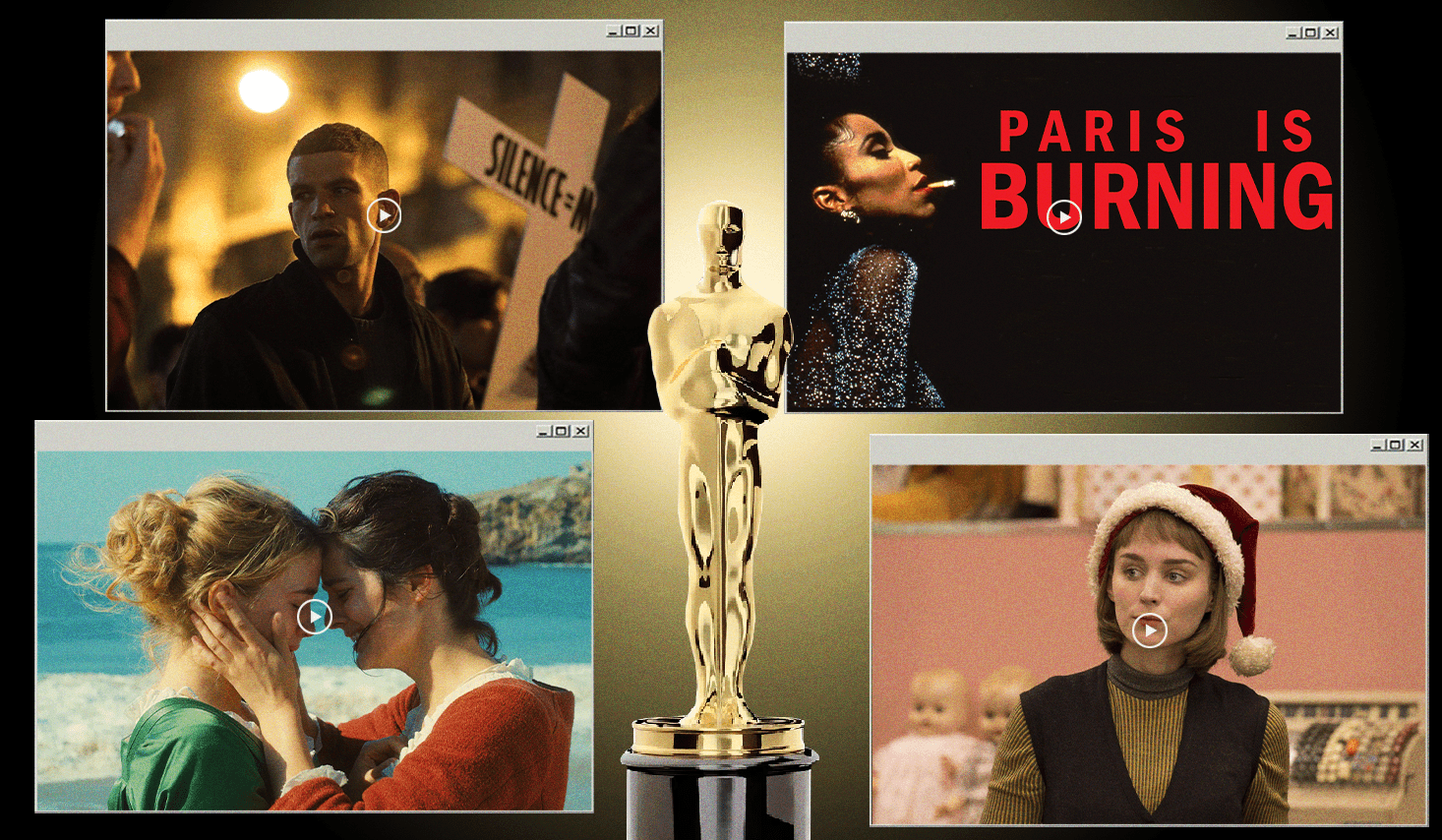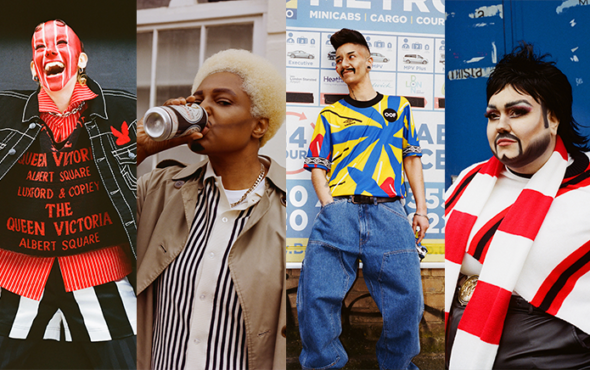
The Academy’s history with rewarding LGBTQIA+ stories has always been grim. Since the prestigious awards ceremony debuted in 1929 – almost a century ago – cis-het films have reigned supreme, and those with LGBTQIA+ narratives have been widely snubbed.
In the rare case that an LGBTQIA+ film has been recognised, it’s to award a cis-het actor for embodying a character whose sexuality and/or gender identity they don’t personally align with: Rami Malek in Bohemian Rhapsody, Sean Penn in Milk, Jared Leto in Dallas Buyers Club, Hilary Swank in Boys Don’t Cry and so forth.
While it’s important to recognise that strides have been made in recent years – such as Barry Jenkins’ lauded 2016 drama Moonlight winning the coveted Best Picture and Ariana DeBose making history as the first queer woman of colour to win an Oscar in an acting category – it’s still rare for the Academy to honour authentic LGBTQIA+ stories.
Ahead of the 96th Academy Awards, we’re reflecting on the iconic – and groundbreaking – LGBTQIA+ films that deserved more, from Jennie Livingston’s trailblazing 1990 documentary Paris is Burning and Saim Sadiq’s commended debut Joyland.
120 BPM (Beats per Minute) (2017)
Cast: Nahuel Pérez Biscayart, Arnaud Valois, Adèle Haenel, Antoine Reinartz, Felix Marituad, Médhi Touré, Aloïse Sauvage
Directed by Robin Campillo, 120 BPM (Beats Per Minute) was one of the most lauded and decorated films of 2018, winning six César Awards – including Best Film – and the Grand Prix, yet it failed to garner a single Academy Award nomination. Chronicling the members of ACT UP (AIDS Coalition to Unleash Power) in 1990s France to spectacular – and heart-wrenching – effect, with powerhouse leading performances from Nahuel Pérez Biscayart and Arnaud Valois, the drama at least deserved a nod for Best Foreign Language Film.
Blue is the Warmest Color (2013)
Cast: Léa Seydoux, Adèle Exarchopoulos, Salim Kechiouche, Aurélien Recoing, Catherine Salée, Benjamin Siksou
Based on the 2010 graphic novel of the same name from Jul Maroh, Blue is the Warmest Color follows the relationship between French teenager Adèle (Adèle Exarchopoulos) and the blue-haired art student Emma (Léa Seydoux). With its unanimously positive critical reception and success at awards ceremonies – it made history as the first film to win the Palme d’Or for both the director and lead actresses – it seemed like a sure-fire nominee for Best Foreign Language Film. Like 120 BPM, however, it was entirely snubbed.
Carol (2015)
Cast: Cate Blanchett, Rooney Mara, Sarah Paulson, Jake Lacy, Kyle Chandler, John Magaro, Cory Michael Smith
Unlike the above entries – and most entries on this list, actually – the Oscars recognised the existence of Carol, bequeathing the iconic romance with six nominations including Best Actress for Cate Blanchett and Best Supporting Actress for Rooney Mara. The Academy were widely criticised, though, when they omitted Carol from Best Picture and Best Director, which many critics attributed to the LGBTQIA+ themes and its trailblazing portrayal of, not just queer women, but women in general. The Todd Haynes-directed drama follows an older woman (Blanchett) navigating a difficult divorce who embarks on a forbidden love affair with an aspiring female photographer (Mara).
The Death and Life of Marsha P. Johnson (2017)
Netflix’s documentary about Marsha P. Johnson, directed by David France, explores the trans trailblazer’s inspiring journey as a founding member of the Gay Liberation Front and her part in the Stonewall Uprising of 1969, as well as the mysterious circumstances surrounding her death in 1992. The Death and Life of Marsha P. Johnson was amongst the most acclaimed films of 2017 and has since been hailed as groundbreaking for LGBTQIA+ and trans visibility, yet the story didn’t make much of an impact with any major awarding bodies, let alone the Academy.
Disclosure (2020)
Exploring how transgender people are depicted in the mainstream and the impact of their stories on transgender lives and U.S. culture, Disclosure features interviews with prominent LGBTQIA+ stars such as Laverne Cox, Trace Lysette, Angelica Ross, Candis Cayne and Brian Michael Smith. In similar vein to some of the aforementioned films, Disclosure was met with universal critical praise, yet it didn’t translate into awards galore. At the 93rd Academy Awards, Best Documentary Feature was awarded to My Octopus Teacher.
Joyland (2023)
Cast: Ali Junejo, Rasti Farooq, Alina Khan, Sarwat Gilani, Salmaan Peerzada, Sohail Sameer, Sania Saeed
Set in Pakistan’s capital city, Joyland stars Ali Junejo as Haider, the son of a strict middle-class patriarch who falls in love with Biba (Alina Khan), a transgender dancer, when he begins work at an erotic dance theater. The film, which marks Saim Sadiq’s feature directorial debut, tackles economical difficulties and the pressures of the patriarchy in Pakistan. Although Joyland made history as the first Pakistani film to be shortlisted at the Academy for Best International Feature Film, it didn’t secure any nominations.
Paris is Burning (1990)
Chronicling the ball culture of New York City and the African-American, Latino, gay, and transgender communities involved, Jennie Livingston’s 1990 documentary is one of the most revered LGBTQ+ films in history; it also received praise during a time of legal and cultural obstacles for the LGBTQ+ community. When Paris is Burning failed to receive a nomination for Best Documentary Feature, the Academy of Motion Picture Arts and Sciences were widely criticised of homophobia and transphobia.
Portrait of a Lady on Fire (2019)
Cast: Noémie Merlant, Adèle Haenel, Luàna Bajrami, Valeria Golino
Set in France in the late 18th century, Portrait of a Lady on Fire tells the story of a forbidden love affair between Héloïse (Adèle Haenel) an aristocrat, and Marianne (Noemie Merlant), an artist commissioned to paint her portrait. The historical drama made history when it screened at the Cannes Film Festival, with Céline Sciamma becoming the first ever female director to win the coveted Queer Palm award. It earned further nominations at the Critics’ Choice Awards and Golden Globe Awards, and became the second highest-reviewed film on Rotten Tomatoes in 2019. It received zero Academy Award nominations.
Tangerine (2015)
Cast: Kitana Kiki Rodriguez, Mya Taylor, Karren Karagulian, Mickey O’Hagan, Alla Tumanian, James Ransone
Tangerine follows Los Angeles-based transgender sex worker Sin-Dee Rella (Kitana Kiki Rodriguez), who finds out that from her best friend Alexandra (Mya Taylor) that her boyfriend and drug dealer Chester (James Ransome) has been cheating on her with a cisgender woman while she’s been in prison. Filmed using only three iPhone 5S smartphones, Tangerine is a buddy-comedy that puts trans narratives at the forefront without reducing them to victims or forcing sympathy from viewers, while also setting an important precedent for casting trans actors in trans roles. The 2015 film marked the first time a movie distributor backed an awards season push for a transgender actress for both Rodriguez and Taylor, though neither were nominated.



